
“Mobile School” is set to revolutionize Thai education with its proactive, flexible, and responsive approach to the unique needs of learners. Every child embarks on a personalized, practical learning journey, crafted to match their aptitudes and interests — no more one-size-fits-all education — and empower them to apply their knowledge in real-life scenarios for livelihood. With Mobile School, they can study anytime, anywhere, and earn at least a Grade 12 certificate to enhance their income and live a self-reliant life with dignity. This trailblazing project is a collaborative powerhouse, involving the Office of the Basic Education Commission (OBEC), social institution learning centers under Article 12 of the National Education Act B.E. 2542, and a vibrant network of the EEF’s partners from the private sector, various professional fields, and local communities, all joining forces to deliver learning opportunities and educational certifications right to the doorsteps of children and youth who have slipped through the educational cracks nationwide.
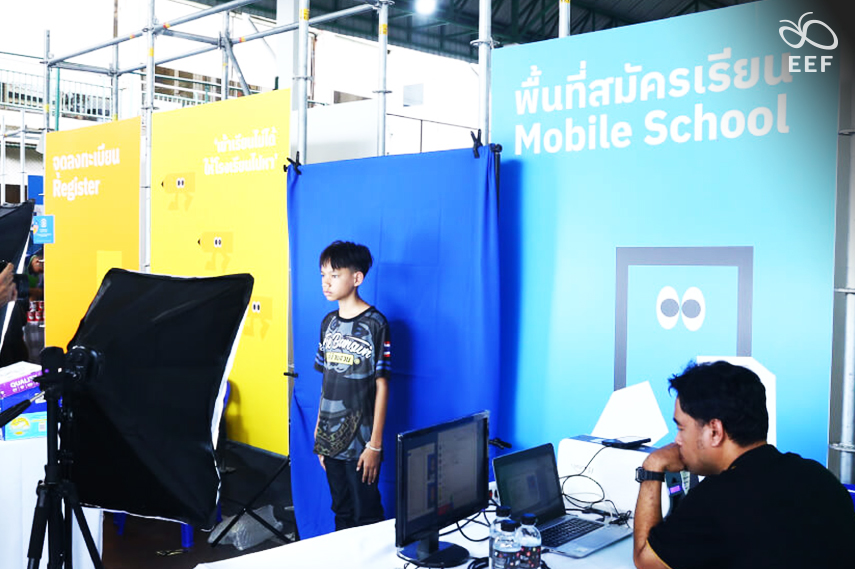
Within the Mobile School initiative, the delivery of this education will be managed by social institution learning centers nationwide, utilizing both online and onsite formats to ensure accessibility and flexibility, all powered by “Learning Mentors.” Stepping into the role of “learning designers,” these mentors will provide personalized advice and co-create educational plans tailored to each student’s unique readiness, abilities, and interests, all in close collaboration with “Case Managers.” Engaging directly with out-of-system children and youth, these managers provide immediate assistance and design individualized care plans covering housing, mental health, education, and family-related issues, to ensure access to basic welfare and learning opportunities, thereby effectively preventing both initial and recurring dropouts. This interconnected support system ensures a holistic and nurturing learning environment, where care and guidance flow effortlessly from one player to the next, all for the benefit of children and youth. Through this dynamic and innovative approach, Mobile School is transforming educational access and learning outcomes for socio-economically disadvantaged children across Thailand, creating a network of support that adapts to each child’s needs.
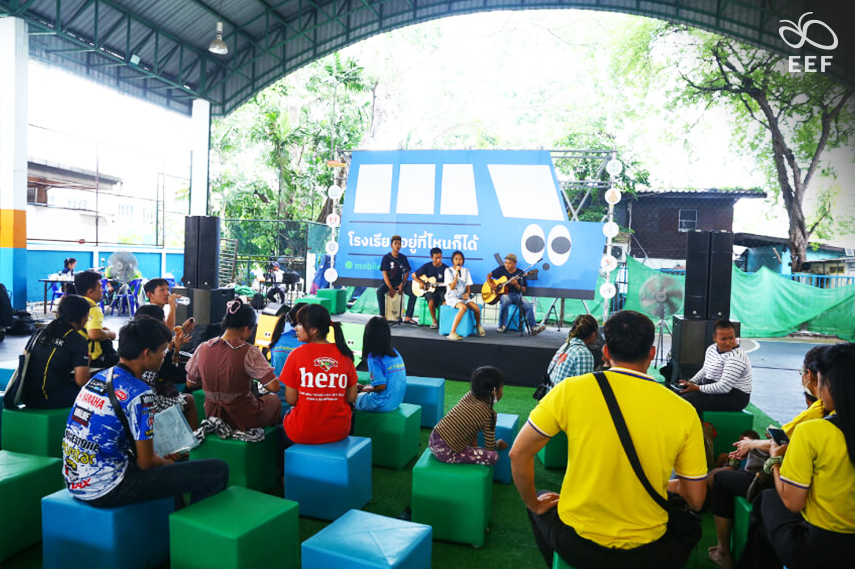
Mobile School employs a diverse array of learning methods and assessment tools, seamlessly integrating academic, life, and vocational skills. Students accumulate learning evidence and build their portfolios through a rich tapestry of activities, media, photos, worksheets, vocational training records, job completion documentation, certificates, diplomas, and awards. Open to children and youth aged 7-24 who face life constraints that prevent them from attending traditional schools or other educational institutions, Mobile School offers comprehensive education: primary education up to Grade 6, junior high up to Grade 9, and senior high up to Grade 12.
Children and youth who have dropped out of school and lack complete educational qualifications are also welcome to apply to Mobile School. The initiative offers equivalency methods to facilitate the transfer of academic records. Learning mentors and Mobile School advisors will provide dedicated support to help students reconnect with their previous schools to retrieve and address incomplete grades — whether marked as Fail, Waiting Consideration, or Unqualified for Test. This process ensures that students can integrate their past academic efforts into their new learning journey, paving the way for them to earn the credentials they need to move forward confidently.
In addition to its core mission, Mobile School partners with the Opportunity Bank and the Mirror Foundation’s Redistribution Center to ensure that all participating children and youth are equipped with essential learning tools. The program provides computers, laptops, and mobile phones in good condition for those without access to online devices. Beyond digital tools, students receive a diverse range of educational materials, including art supplies, sports equipment, handicraft tools, and vocational training resources, all tailored to meet their individual needs. This comprehensive support ensures that every child can fully engage with their education, bridging gaps and creating a more inclusive learning experience.
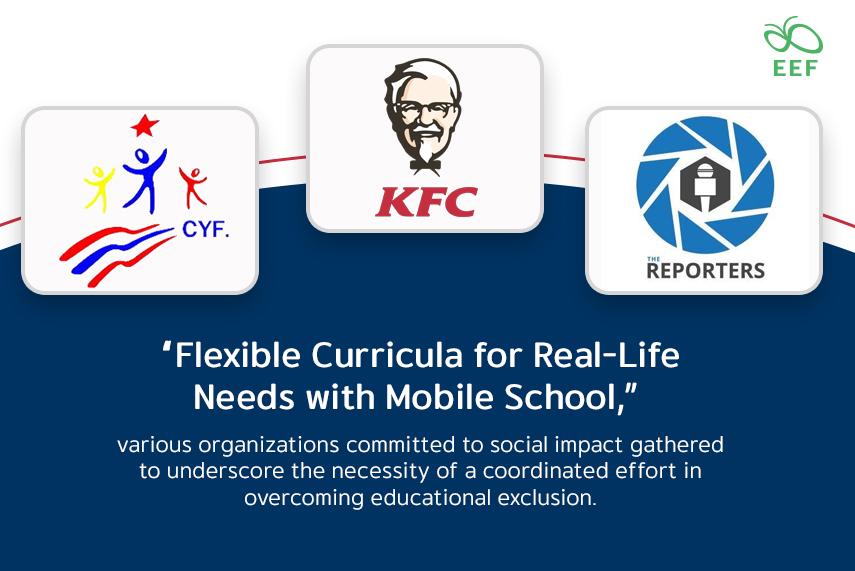
Despite the significant efforts and resources dedicated to addressing educational disparities, it has become increasingly clear that these challenges are too extensive of a challenge for any single entity to tackle independently; the scale of educational inequities demands a unified approach, where diverse sectors collaborate to forge substantial and sustainable improvements. This reality was compellingly corroborated during the recent panel discussion titled “Flexible Curricula for Real-Life Needs with Mobile School,” held on July 6th, 2024. At this pivotal event, various organizations committed to social impact gathered to underscore the necessity of a coordinated effort to overcome educational exclusion. The panel brought together voices from multiple sectors, each contributing insights on how to develop effective educational programs tailored for children and youth who have fallen out of the traditional educational system and sought effective methods for their reintegration, most notably Community Mobile School model by CYF Learning Center, Entrepreneurial Mobile School model by KFC Thailand, and Journalist Mobile School model by The Reporters. The consensus was clear: addressing the complex issue of educational exclusion requires a concerted, multi-sectoral approach rather than isolated initiatives.
The Community Mobile School model, introduced by the CYF Learning Center in partnership with local entities in Nakhon Phanom, aims to tackle educational inequities by providing tailored learning directly to out-of-school children. This model offers customized programs aligned with students’ interests: for instance, children from stone mortar-producing areas study the full production process, while those with agricultural backgrounds receive training in rice cultivation and fertilizer management. Unlike traditional education’s focus on standardized testing, this model emphasizes both educational and vocational opportunities, facilitating reintegration into the educational system or presenting viable alternatives. By integrating mobile learning systems and collaborating with local organizations, the Community Mobile School model has achieved near-complete reintegration of students.
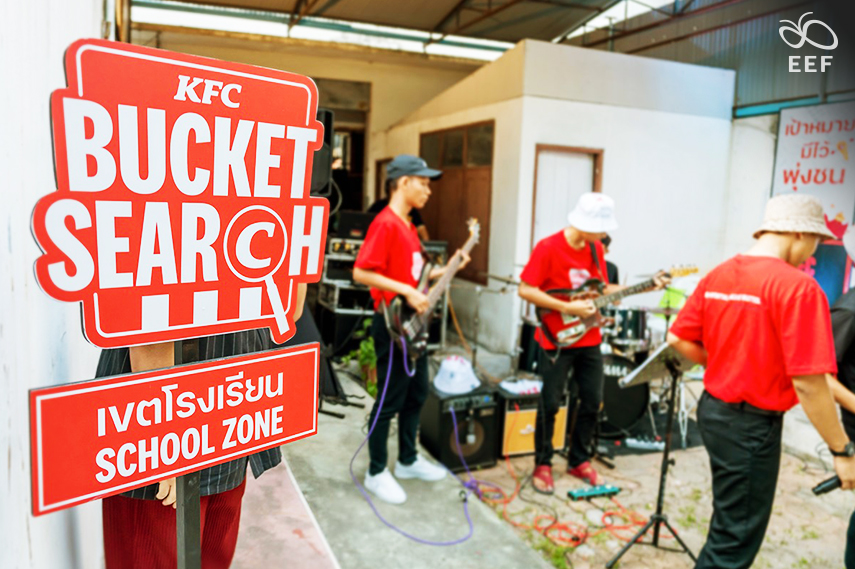
On the other hand, the Entrepreneurial Mobile School model, part of KFC Thailand’s Bucket Search project, emphasizes practical learning and vocational skills to enable children and youth to uncover their potential. It offers a diverse curriculum akin to KFC’s training programs, which encompasses both front-end customer interaction and back-end operational management. These include food service, sanitation, business language skills, finance, creative arts, and organizational communication. Additionally, by partnering with industry experts, this model supports students in pursuing newfound interests, such as hairstyling, nursing, journalism, or singing. Beyond professional and entrepreneurial training, the Entrepreneurial Mobile School model provides recognized qualifications and credits, linking hands-on achievements with educational milestones and thereby making learning experiences transferable for further education.
Meanwhile, the Journalist Mobile School model, managed by The Reporters, provides out-of-school children with immersive, real-world learning experiences. This model delivers vocational training in journalism, equipping students with essential skills such as interviewing, news writing, analysis, and on-camera reporting. Utilizing mobile phones and social media, the curriculum promotes effective communication, enabling students to address community issues and amplify socio-economically marginalized voices. By merging theory with practice, this model opens diverse career paths, including live-streaming and public presentations. The Journalist Mobile School model not only imparts practical skills that lead to tangible career opportunities but also builds the confidence necessary for students to excel in today’s dynamic media landscape.
Within the framework of Mobile School, efforts to address educational disparities reveal that systemic issues extend far beyond financial constraints. Insights from the CYF Learning Center highlight how social challenges, such as bullying and ineffective school systems, contribute to children falling out of education. KFC’s Bucket Search project focuses on enhancing opportunities for underprivileged youth and bridging educational gaps, while The Reporters underscores the value of real-world, experience-based learning in today’s context. Though collaboration among diverse organizations poses challenges, the Mobile School initiative stands as a powerful testament to hope and adaptability. By bringing flexible, contextually relevant education directly to those in need, it revitalizes the prospects of out-of-school children and youth, offering them renewed opportunities and a pathway to a brighter future.
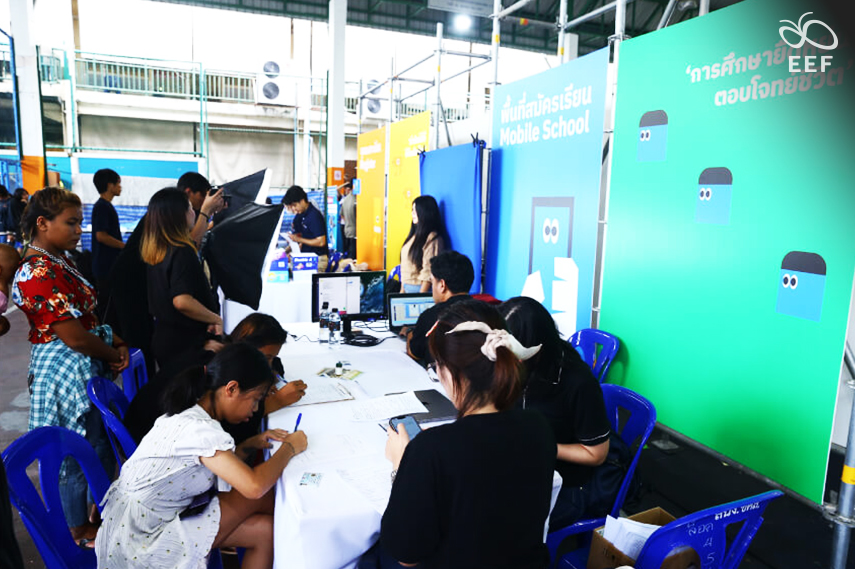
If envisioned as a school bus, School Mobile’s destination embodies the very essence of self-discovery and empowerment. Its mission is to guide children in uncovering their true potential, setting meaningful life goals, and pursuing their aspirations with vigor. In the long term, the initiative aims to spread awareness about the Mobile School, empowering both youth and communities to embrace their educational opportunities with widespread support. As education is a continuous journey, the bus is designed to evolve and adapt to the changing needs of students, always steering them toward their desired goals. While many children are still on their path to self-discovery, the initiative not only provides knowledge and certifications but also offers practical experiences that open doors to future opportunities. Ultimately, the Mobile School is dedicated to helping students tell their stories, address community issues, and acquire skills that foster personal growth and economic independence.
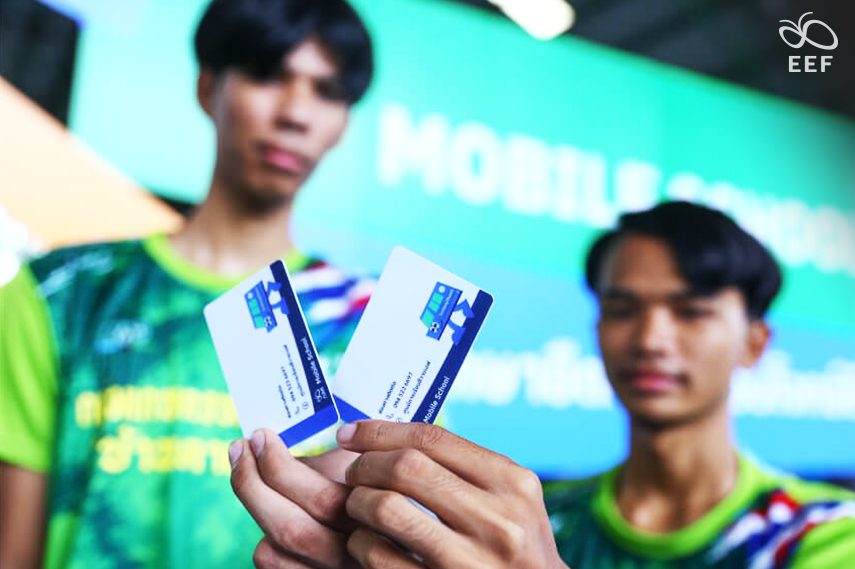
The School Mobile initiative perfectly embodies the Equitable Education Fund (EEF) Thailand’s mission to reduce educational inequality through tailored support and collaborative efforts. This initiative encompasses three distinct models: the Community Mobile School model by the CYF Learning Center, the Entrepreneurial Mobile School model by KFC Thailand, and the Journalist Mobile School model by The Reporters. Each model addresses unique aspects of educational disparity by offering personalized learning experiences and practical skills. Together, these models bridge gaps in access and support, perfectly aligning with the Fund’s ethos of enhancing educational opportunities for all.

